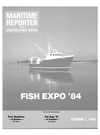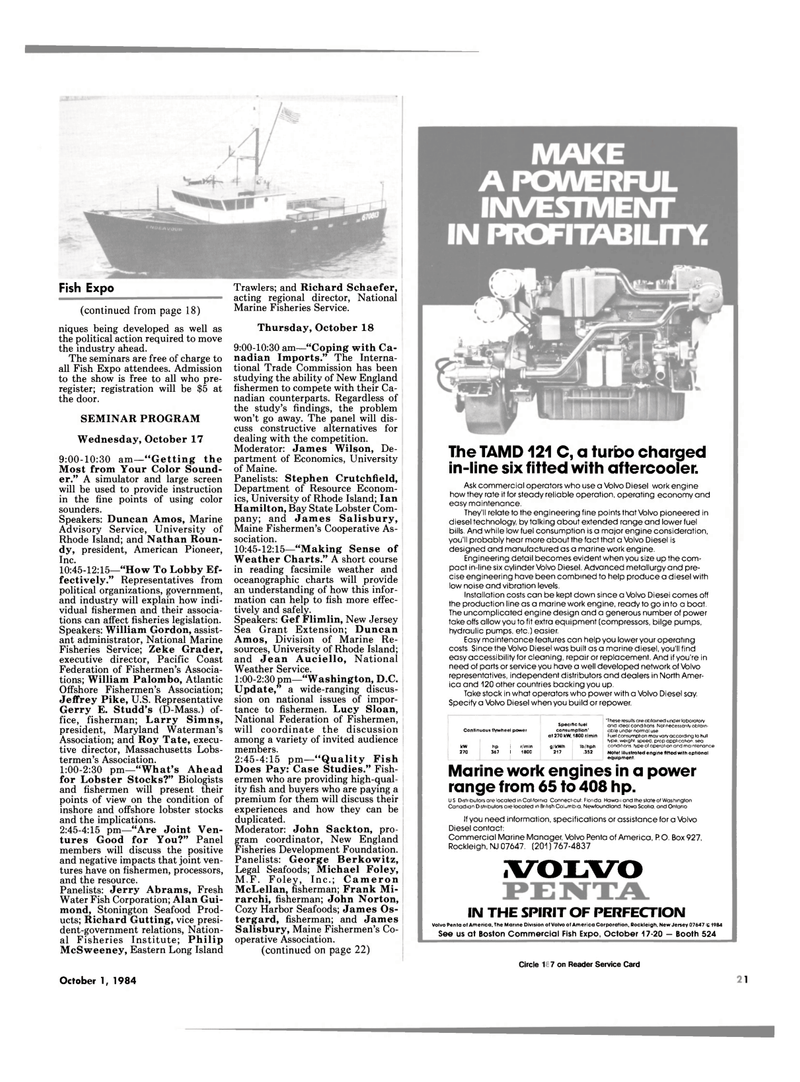
Page 21: of Maritime Reporter Magazine (October 1984)
Read this page in Pdf, Flash or Html5 edition of October 1984 Maritime Reporter Magazine
Fish Expo (continued from page 18) niques being developed as well as the political action required to move the industry ahead.
The seminars are free of charge to all Fish Expo attendees. Admission to the show is free to all who pre- register; registration will be $5 at the door.
SEMINAR PROGRAM
Wednesday, October 17 9:00-10:30 am—"Getting the
Most from Your Color Sound- er." A simulator and large screen will be used to provide instruction in the fine points of using color sounders.
Speakers: Duncan Amos, Marine
Advisory Service, University of
Rhode Island; and Nathan Roun- dy, president, American Pioneer,
Inc. 10:45-12:15—"How To Lobby Ef- fectively." Representatives from political organizations, government, and industry will explain how indi- vidual fishermen and their associa- tions can affect fisheries legislation.
Speakers: William Gordon, assist- ant administrator, National Marine
Fisheries Service; Zeke Grader, executive director, Pacific Coast
Federation of Fishermen's Associa- tions; William Palombo, Atlantic
Offshore Fishermen's Association;
Jeffrey Pike, U.S. Representative
Gerry E. Studd's (D-Mass.) of- fice, fisherman; Larry Simns, president, Maryland Waterman's
Association; and Roy Tate, execu- tive director, Massachusetts Lobs- termen's Association. 1:00-2:30 pm—"What's Ahead for Lobster Stocks?" Biologists and fishermen will present their points of view on the condition of inshore and offshore lobster stocks and the implications. 2:45-4:15 pm—"Are Joint Ven- tures Good for You?" Panel members will discuss the positive and negative impacts that joint ven- tures have on fishermen, processors, and the resource.
Panelists: Jerry Abrams, Fresh
Water Fish Corporation; Alan Gui- mond, Stonington Seafood Prod- ucts; Richard Gutting, vice presi- dent-government relations, Nation- al Fisheries Institute; Philip
McSweeney, Eastern Long Island
Trawlers; and Richard Schaefer, acting regional director, National
Marine Fisheries Service.
Thursday, October 18 9:00-10:30 am—"Coping with Ca- nadian Imports." The Interna- tional Trade Commission has been studying the ability of New England fishermen to compete with their Ca- nadian counterparts. Regardless of the study's findings, the problem won't go away. The panel will dis- cuss constructive alternatives for dealing with the competition.
Moderator: James Wilson, De- partment of Economics, University of Maine.
Panelists: Stephen Crutchfield,
Department of Resource Econom- ics, University of Rhode Island; Ian
Hamilton, Bay State Lobster Com- pany; and James Salisbury,
Maine Fishermen's Cooperative As- sociation. 10:45-12:15—"Making Sense of
Weather Charts." A short course in reading facsimile weather and oceanographic charts will provide an understanding of how this infor- mation can help to fish more effec- tively and safely.
Speakers: Gef Flimlin, New Jersey
Sea Grant Extension; Duncan
Amos, Division of Marine Re- sources, University of Rhode Island; and Jean Auciello, National
Weather Service. 1:00-2:30 pm—"Washington, D.C.
Update," a wide-ranging discus- sion on national issues of impor- tance to fishermen. Lucy Sloan,
National Federation of Fishermen, will coordinate the discussion among a variety of invited audience members. 2:45-4:15 pm—"Quality Fish
Does Pay: Case Studies." Fish- ermen who are providing high-qual- ity fish and buyers who are paying a premium for them will discuss their experiences and how they can be duplicated.
Moderator: John Sackton, pro- gram coordinator, New England
Fisheries Development Foundation.
Panelists: George Berkowitz,
Legal Seafoods; Michael Foley,
M.F. Foley, Inc.; Cameron
McLellan, fisherman; Frank Mi- rarchi, fisherman; John Norton,
Cozy Harbor Seafoods; James Os- tergard, fisherman; and James
Salisbury, Maine Fishermen's Co- operative Association. (continued on page 22)
The TAMD121 C, a turbo charged in-line six fitted with aftercooler.
Ask commercial operators who use a Volvo Diesel work engine how they rate it for steady reliable operation, operating economy and easy maintenance.
They'll relate to the engineering fine points that Volvo pioneered in diesel technology by talking about extended range and lower fuel bills. And while low fuel consumption is a major engine consideration, you'll probably hear more about the fact that a Volvo Diesel is designed and manufactured as a marine work engine.
Engineering detail becomes evident when you size up the com- pact in-line six cylinder Volvo Diesel. Advanced metallurgy and pre- cise engineering have been combined to help produce a diesel with low noise and vibration levels.
Installation costs can be kept down since a Volvo Diesei comes off the production line as a marine work engine, ready to go into a boat.
The uncomplicated engine design and a generous number of power take offs allow you to fit extra equipment (compressors, bilge pumps, hydraulic pumps, etc.) easier.
Easy maintenance features can help you lower your operating costs. Since the Volvo Diesel was built as a marine diesel, you'll find easy accessibility for cleaning, repair or replacement. And if you're in need of parts or service you have a well developed network of Volvo representatives, independent distributors and dealers in North Amer- ica and 120 other countries backing you up.
Take stock in what operators who power with a Volvo Diesel say.
Specify a Volvo Diesel when you build or repower. "These results are obtained under laboratory Specific tuel and ideal conditions. Not necessarily obtain-
Continuous ftywheel power consumption* able under normal use. at 270 kW, 1800 r/min Fuel consumption may vary according to hull type, weight, speed, prop application, sea kW hp I r/min g/kWh Ib/hph conditions, type of operation and maintenance 270 367 1800 217 .352 Note! Illustrated engine fitted with optional equipment.
Marine work engines in a power range from 65 to 408 hp.
US Distributors are located in California Connecticut Florida Hawaii and the state of Washington
Canadian Distributors are locoted in British Columbia, Newfoundland Novo Scotia, ond Ontario
If you need information, specifications or assistance for a Volvo
Diesel contact:
Commercial Marine Manager, Volvo Penta of America, P. O Box 927,
Rockleigh, NJ 07647. (201) 767-4837
VOLVO
IN THE SPIRIT OF PERFECTION
Volvo Penta of America, The Marine Division of Volvo of America Corporation, Rockleigh, New Jersey 07647 C19&4
See us at Boston Commercial Fish Expo, October 17-20 — Booth 524
Circle 217 on Reader Service Card
October 1, 1984 61

 20
20

 22
22
